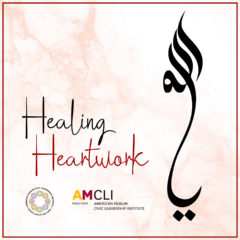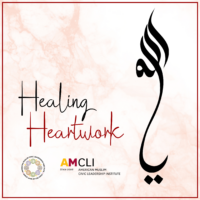Deepening our understanding of Islamic tools for healing, self-care and community care
In response to the emerging needs of its fellows, AMCLI launched a series of Healing Heartwork Toolkits to provide Islamic practices and tools for healing, grounding, centering and exploring the self during Ramadan 2021. We continue this series with a new Healing Heartwork toolkit in 2022, focused on deepening our understanding of Islamic self-care modalities. Both toolkits are presented during Ramadan as a time for reflection, spirituality and nurturing a connection to the Divine, self and community.
The first toolkit, Healing Heartwork: Exploring Self, focused on cultivating afiya, or emotional well-being, through practices that create moments of sakina, or tranquility. This toolkit, Healing Heartwork: Exploring Loss, focuses on janazah, or funeral rites, as a way to address experiences of grief and loss as we enter year three of a global pandemic.
AMCLI has partnered with Chaplain Sondos Kholaki, who crafted the toolkits based on her years of experience in supporting and accompanying individuals in crisis on their healing journey. Over the month of Ramadan, AMCLI and Ch. Sondos Kholaki will release Healing Heartwork: Exploring Loss in three parts, with each part focused on a relevant Ramadan theme.
- Part One: Mercy, focused on rituals honoring creation, including our body and the environment.
- Part Two: Forgiveness, focused on rituals for the mind and the heart.
- Part Three: Safety, focused on finding the way between soul (ruh) care and self (nafs) care
Follow along on Instagram at USC CRCC and Ch. Sondos Kholaki or on Facebook on USC CRCC’s page or AMCLI’s page. AMCLI fellows will also receive email reminders when each part is released throughout Ramadan.
Download Healing Heartwork Volume Two: Exploring Loss
About the Healing Heartwork Toolkit: Exploring Loss
Living through a global pandemic affects all aspects of our being: mind, body and soul/spirit. In Islamic belief, one does not experience life without also experiencing loss (2:153), and over the past two years, that loss manifested in various ways, from the loss of loved ones to the loss of familiar routines and simple connections with family, friends and colleagues.
In the midst of these challenging disruptions, we may find it helpful to hold a funeral of sorts as a way to acknowledge the many losses we have endured. In Healing Heartwork: Exploring Loss, we will weave into the three stages of Ramadan the beautiful Islamic rituals surrounding death. In doing so, we hope to provide an opportunity to process the losses we have experienced on both individual and collective levels while uplifting the themes of Ramadan: mercy, forgiveness and spiritual safety, as referenced in the Hadith by the beloved Prophet Muhammad ﷺ.
Healing Heartwork: Exploring Loss provides an opportunity to reflect on ritual. Ritual transforms an otherwise mundane act into one infused with the presence of God. In Islamic tradition, every action–from the simple to the complex–invites a moment of pause to remember Allah. For instance, when we wear a new piece of clothing, we thank and praise God and remind ourselves of the purpose of dress, and when we climb into our car every morning, we praise God for His provision and remind ourselves that we will return to Him. So too, the Islamic rituals surrounding death and bereavement serve to capture the attention of the living and remind those of us connected to the deceased to assess our lives in preparation for our inevitable return.
Ritual also connects us to our spiritual lineage and ancestry in word and deed. When we bow in ruku’, a bowing position in the Islamic prayer, we may imagine our forebears bowing in the exact same way toward the exact same place, perhaps having brought their own concerns, fears and hopes to the prayer space, as we do today. In an increasingly physically disconnected and distanced world, reclaiming this intentional connection through ritual to our spiritual community–past, present and future–may offer a balm for our aching hearts.
In Islam, we believe that Allah created humankind with the ability to withstand hardship, trauma and calamity through the healing modalities present in so many of the rituals prescribed for us, from wudu to salat to the sunnah of the Prophet ﷺ. The repetitive and enduring nature of ritual provides comfort and familiarity in times of fluctuation, an important coping strategy when crises emerge. Through this closer look at the Islamic funeral rituals, we may have the opportunity to pause and reflect on the losses we have all endured while drawing peace from spiritual practices focused on honoring the body, mind, heart and soul.
About Chaplain Sondos Kholaki
 Chaplain Sondos Kholaki serves as a hospital staff chaplain and a volunteer community chaplain in Southern California, and is an AMCLI fellow. She is board-certified with the Association of Professional Chaplains (APC). Sondos earned a Master of Divinity degree in Islamic Chaplaincy from Bayan Islamic Graduate School/Claremont School of Theology and a Bachelor of Arts in English and Creative Writing from UCLA as a Regents Scholar. Sondos completed five units of Clinical Pastoral Education (CPE) residency where she served care seekers of all faiths and educated staff and volunteers on Muslim spiritual care. Sondos is the author of Musings of a Muslim Chaplain ( 2020) and the co-editor of Mantle of Mercy: Islamic Chaplaincy in North America ( 2022). Sondos enjoys sipping a perfectly brewed cup of coffee, listening to Quran recitation by Turkish reciters and singing her heart out at spiritual gatherings. She is married and has two children.
Chaplain Sondos Kholaki serves as a hospital staff chaplain and a volunteer community chaplain in Southern California, and is an AMCLI fellow. She is board-certified with the Association of Professional Chaplains (APC). Sondos earned a Master of Divinity degree in Islamic Chaplaincy from Bayan Islamic Graduate School/Claremont School of Theology and a Bachelor of Arts in English and Creative Writing from UCLA as a Regents Scholar. Sondos completed five units of Clinical Pastoral Education (CPE) residency where she served care seekers of all faiths and educated staff and volunteers on Muslim spiritual care. Sondos is the author of Musings of a Muslim Chaplain ( 2020) and the co-editor of Mantle of Mercy: Islamic Chaplaincy in North America ( 2022). Sondos enjoys sipping a perfectly brewed cup of coffee, listening to Quran recitation by Turkish reciters and singing her heart out at spiritual gatherings. She is married and has two children.
About AMCLI
The American Muslim Civic Leadership Institute (AMCLI) develops and trains American Muslim leaders who are committed to civic engagement. AMCLI strives to accompany these pioneering leaders as they realize their full potential, and in doing so, have a more effective and sustained impact on the issues affecting their communities, and America at large.
A Note on Islamic Death Meditations
Each part of the Healing Heartwork: Exploring Loss series will conclude with an Islamic death meditation. Many Muslim scholars and sages practiced regular meditations on death to visualize one’s own journey at the end of life for the purposes of spiritual development. Imam Abu Hamid al-Ghazali, a theologian and mystic philosopher of the 12th century, famously wrote and practiced death meditations, the inspiration of which directly informs our revival of these practices for our use this Ramadan season.
Theologians of various faith traditions and philosophies agree that contemplating one’s mortality aids in living a more purposeful life wherein one prioritizes that which aligns best with one’s values as well as deepens one’s sense of gratitude. In the midst of a pandemic, death meditations may help in alleviating a sense of fear toward our inevitable end by providing us with an opportunity to imagine ourselves in this realm of the unknown. Death meditations also create a space for us to sincerely reflect on our life, our relationships with others and, most importantly, our relationship with the Divine. We can then assess which aspects of our lives need our attention.
The Healing Heartwork Toolkit:Exploring Loss is a collaboration between AMCLI and Chaplain Sondos Kholaki.
Chaplain Sondos Kholaki is an AMCLI fellow and guest contributor with the USC Center for Religion and Civic Culture.


